|
|
|
Sort Order |
|
|
|
Items / Page
|
|
|
|
|
|
|
| Srl | Item |
| 1 |
ID:
132051
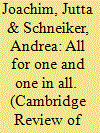

|
|
|
|
|
| Publication |
2014.
|
| Summary/Abstract |
With governments increasingly contracting private military and security companies (PMSCs) to perform military and police-related tasks, international relations scholars have made attempts to better understand PMSCs and to investigate the reasons for the boom of private security. Rather than focusing on the services these companies offer, which has been a common approach, we offer an identity-based explanation for their surge. We show that PMSCs eclectically assume identities related to the military, business managers and humanitarians, independent of the services they perform, their market segment or their location on the battlefield. This finding points to an important yet little-noted dimension in the private security industry. Although companies are heterogeneous, they also appear increasingly homogeneous because they incorporate a similar set of identities. On the one hand, this enables PMSCs to adapt to any context, client or employee, and, on the other hand, it has constitutive qualities, contributing to an important source of power for the respective companies. These multiple identities contribute to a norm of what a superior security provider should look like.
|
|
|
|
|
|
|
|
|
|
|
|
|
|
|
|
| 2 |
ID:
134066
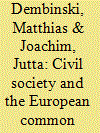

|
|
|
|
|
| Publication |
2014.
|
| Summary/Abstract |
The involvement of civil society organizations (CSOs) is widely regarded by students of the EU's domestic policy fields as enhancing transparency and accountability and, more generally, the democratic quality of political processes. This article explores the contribution of CSOs to the EU's Common Security and Defence Policy and assesses whether a democracy-enhancing effect of their involvement can also be demonstrated for this policy field. We analyse the contribution of CSOs based on two common models of democracy: the intergovernmental and the supranational model of democracy. We find that CSOs are indeed quite actively involved in the EU's security policy. With regard to their democracy-enhancing effects, however, our findings are rather mixed. While the engagement of CSOs does provide a remedy for the democratic deficits associated with intergovernmental decision-making, these organizations do not fully meet the demands posed by supranational governance.
|
|
|
|
|
|
|
|
|
|
|
|
|
|
|
|
| 3 |
ID:
155809
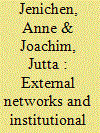

|
|
|
|
|
| Summary/Abstract |
In 2008, the Council of the European Union (EU) adopted a ‘Comprehensive Approach’ that outlines a strategy for securing gender mainstreaming; two years later, the Council introduced a set of indicators to assess its implementation. The EU was responding to the United Nations Security Council’s call for regional institutions to assist in implementing Security Council Resolution (UNSCR) 1325, adopted on 31 October 2000, concerning ‘women, peace and security’. This resolution sought to meet the ‘urgent need to mainstream a gender perspective into peacekeeping operations’. Considering that prior exposure to gender issues, resources and well-established relations with civil society and gender advocates are lacking, the adoption of both the Comprehensive Approach and the indicators, as well as the structures and procedures established since then as part of the EU’s Common Security and Defence Policy, requires some explanation. This article draws on feminist institutionalist approaches to argue that the impetus for change came from individuals and groups within the EU who were involved in external networks, both above and below the supranational level, who seized on institutional idiosyncrasies that also shaped the implementation of UNSCR 1325 in important ways.
|
|
|
|
|
|
|
|
|
|
|
|
|
|
|
|
| 4 |
ID:
159418
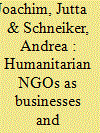

|
|
|
|
|
| Summary/Abstract |
Humanitarian nonprofit nongovernmental organizations (NGOs) today exhibit signs of “marketization” and behave like firms, according to a frequently uttered claim in the scholarly literature. However, it is not precisely clear what marketization and behaving like a firm mean. Drawing on the literature concerning nonprofit organizations and public administration, we offer a more sophisticated and multifaceted understanding of a consequential development for NGOs. Rather than merely equating “firm-like” with the adoption of corporate practices, we conceive of it as a mind-set. We suggest that “firm-like” involves not only marketization, but also corporatization and organizational rationalization. Based on a content analysis of the websites of a heterogeneous sample of nine humanitarian NGOs, we illustrate the potential of this conceptualization to shed light on a discourse among these organizations that appears to be self-referential and self-aggrandizing with respect to their capacities.
|
|
|
|
|
|
|
|
|
|
|
|
|
|
|
|
| 5 |
ID:
110917
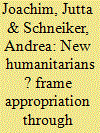

|
|
|
|
|
| Publication |
2012.
|
| Summary/Abstract |
Although private military and security companies (PMSCs) are gaining increasing importance, they still suffer from an image problem. In the media, they are frequently referred to as 'mercenaries' or 'dogs of war'. PMSCs are therefore interested in presenting themselves as legitimate and acceptable contract parties. Based on a discourse analysis of the homepages of select PMSCs and the industry association International Stability Operations Association (ISOA), and drawing on the framing literature, we examine one way in which companies respond to such negative labels. We show not only that PMSCs provide supplemental logistics or security for the staff of humanitarian organisations confronted with complex emergencies and ever-more dangerous missions, but also that these companies appropriate the humanitarian frame discursively, emphasising those elements that fit their interests and needs. To present themselves as 'new humanitarians', PMSCs employ primarily two kinds of strategies: naming and forging alliances with more traditional humanitarian actors. Their growing involvement in this field may not be without consequences and may contribute to the blurring of lines between military and civilian missions.
|
|
|
|
|
|
|
|
|
|
|
|
|
|
|
|
| 6 |
ID:
119998
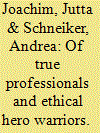

|
|
|
|
|
| Publication |
2012.
|
| Summary/Abstract |
Private military and security companies (PMSCs) have gained increasingly in importance over the course of the past two decades. Yet, given the intransparency of the industry and the heterogeneity of the companies that comprise it, we thus far know little about the actors involved. In this article, we offer preliminary insights into the self-representation of PMSCs, based on a gender-discourse analysis of the homepages of select companies and their main professional associations. We argue that survival in an increasingly competitive industry not only hinges on size, market share or effectiveness, but is also inherently gendered. PMSCs and their associations draw on the one hand on civilized and accepted forms of masculinity and femininity, presenting themselves as 'highly skilled professional' military strategists and ordinary businesses akin to banks or insurance companies. At the same time, however, PMSCs also engage in strategies of (hyper)masculinization and pathologization to set themselves apart from mercenaries, their private competitors and state security forces. In this respect, companies appear to view themselves as 'ethical hero warriors'. Whether intended or not, their strategies have political consequences. Within the security industry, they contribute to the creation and maintenance of a norm regarding what constitutes a legitimate PMSC, to which more or less all companies strive to adhere. Vis-à-vis other security actors, these strategies seek to establish PMSCs as being superior because, unlike these actors, such companies are super-masculine and able to live up to the growing and sometimes contradictory demands of changing security contexts.
|
|
|
|
|
|
|
|
|
|
|
|
|
|
|
|
| 7 |
ID:
159152
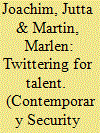

|
|
|
|
|
| Summary/Abstract |
Private military and security companies (PMSCs) play an increasingly important role in the provision of security-related services. In their attempts to win new clients and find suitable personnel, they take on different identities by presenting themselves as conventional businesses, military actors, and humanitarians. In this article, we examine how PMSCs deploy these identities when they recruit new personnel through social media. Our computer-assisted content analysis of Twitter messages posted by two major United States-based companies—CACI and DynCorp International—shows that while both PMSCs amplify their business and military identities to attract the most talented personnel, they construct and communicate these identities in different ways with CACI branding itself as a sophisticated, modern, and patriotic business and DynCorp as a home-grown, traditional military provider. In addition, our analysis lends force to scholars suggesting that state militaries and the private security sector compete increasingly for prospective employees using similar strategies.
|
|
|
|
|
|
|
|
|
|
|
|
|
|
|
|
| 8 |
ID:
188321
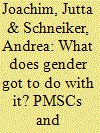

|
|
|
|
|
| Summary/Abstract |
While war and the military have been recognized as being gendered sites, Private Military and Security Companies (PMSCs) are only rarely studied through a gender lens. Compared to functional, political-instrumental or ideational explanations with respect to the privatization of security, such a lens captures, however, the micro-dynamic and political processes of PMSCs’ boom. We show that gender is, first, constitutive of companies’ corporate identities as hero warriors and professional security experts. Second, it is relational, (re-)producing hierarchical power relations among and within PMSCs and with state security actors. Third, gender is a legitimizing factor helping PMSCs to establish themselves as acceptable security actors vis-à-vis others.
|
|
|
|
|
|
|
|
|
|
|
|
|
|
|
|
|
|
|
|
|